Overview
In today's digital landscape, many online companies struggle to stand out amidst fierce competition. This challenge can lead to feelings of frustration and uncertainty, as the visibility of their offerings is often overshadowed by larger players. However, there is hope. By embracing best practices in marketing, such as:
- SEO
- Content marketing
- Social media engagement
These companies can not only enhance their visibility but also build meaningful relationships with customers. These strategies are not just theoretical; they have been proven effective through various statistics and case studies that highlight their impact on driving sales growth. Imagine the relief and success that can come from implementing these methods, fostering a supportive environment for both businesses and their customers. Together, we can navigate this journey toward success, ensuring that every online company has the opportunity to thrive in the digital world.
Introduction
In the ever-changing world of digital marketing, many startups find themselves overwhelmed by the intricacies of online strategies. It can feel daunting to carve out a niche in a crowded marketplace, and the pressure to succeed is palpable. With a myriad of techniques—ranging from search engine optimization to social media engagement—navigating these tools is crucial for enhancing visibility and fostering meaningful customer relationships.
As the digital landscape continues to evolve, the significance of effective branding and the ability to adapt to market trends becomes increasingly important. This article aims to explore the foundational elements of online marketing, offering insights into diverse strategies that can guide tech startups toward sustainable growth and success in 2025 and beyond.
By sharing real-world examples and highlighting the vital role of:
- Performance marketing
- Audience targeting
- The cultivation of long-term partnerships
We hope to provide a supportive framework for achieving measurable results. Together, we can navigate this journey and build a brighter future for your startup.
Understanding Online Marketing: A Foundation for Success
Online promotion presents a myriad of challenges for tech startups striving to advertise their products or services through digital channels. The essential elements, such as search engine optimization (SEO), social media promotion, email outreach, and content promotion, can feel overwhelming. It’s crucial for these companies to master these strategies to cultivate a strong online presence, yet many founders grapple with how to effectively implement them.
When effectively harnessed, these approaches enable marketing online companies to connect with their target audience more efficiently, leading to increased sales and enhanced brand loyalty. Imagine a technology startup that struggles to gain visibility; by leveraging SEO, it can significantly improve its search engine ranking. This is particularly important, as 22% of content marketers consider their efforts successful or very successful. This statistic underscores the power of well-executed online promotional strategies in fostering engagement and driving sales growth. RNO1's innovative performance promotion techniques are tailored to support tech startups in enhancing their effectiveness, potentially increasing that success rate.
Moreover, the surge in video advertising, projected to surpass $191 billion by 2024, highlights the growing importance of dynamic content in promotional strategies. Businesses are increasingly recognizing the return on investment (ROI) tied to video as a promotional tool. RNO1 has successfully implemented video promotion techniques for clients, illustrating how new businesses can harness this medium to elevate their brand visibility and engagement.
Understanding online promotional strategies in 2025 is vital for tech companies, as these methods not only enhance visibility but also nurture customer relationships. Numerous marketing online companies have successfully utilized SEO to amplify their online presence and drive sales. As digital promotion specialists emphasize, foundational strategies like SEO and content creation are essential for gaining a competitive edge in today’s fast-paced digital landscape.
Additionally, RNO1’s commitment to preventing scope creep through transparent communication and collaborative project management, coupled with its flexible month-to-month subscription model, provides ongoing support and expertise. This empowers tech startups to navigate online promotional challenges effectively and adapt to evolving market trends.
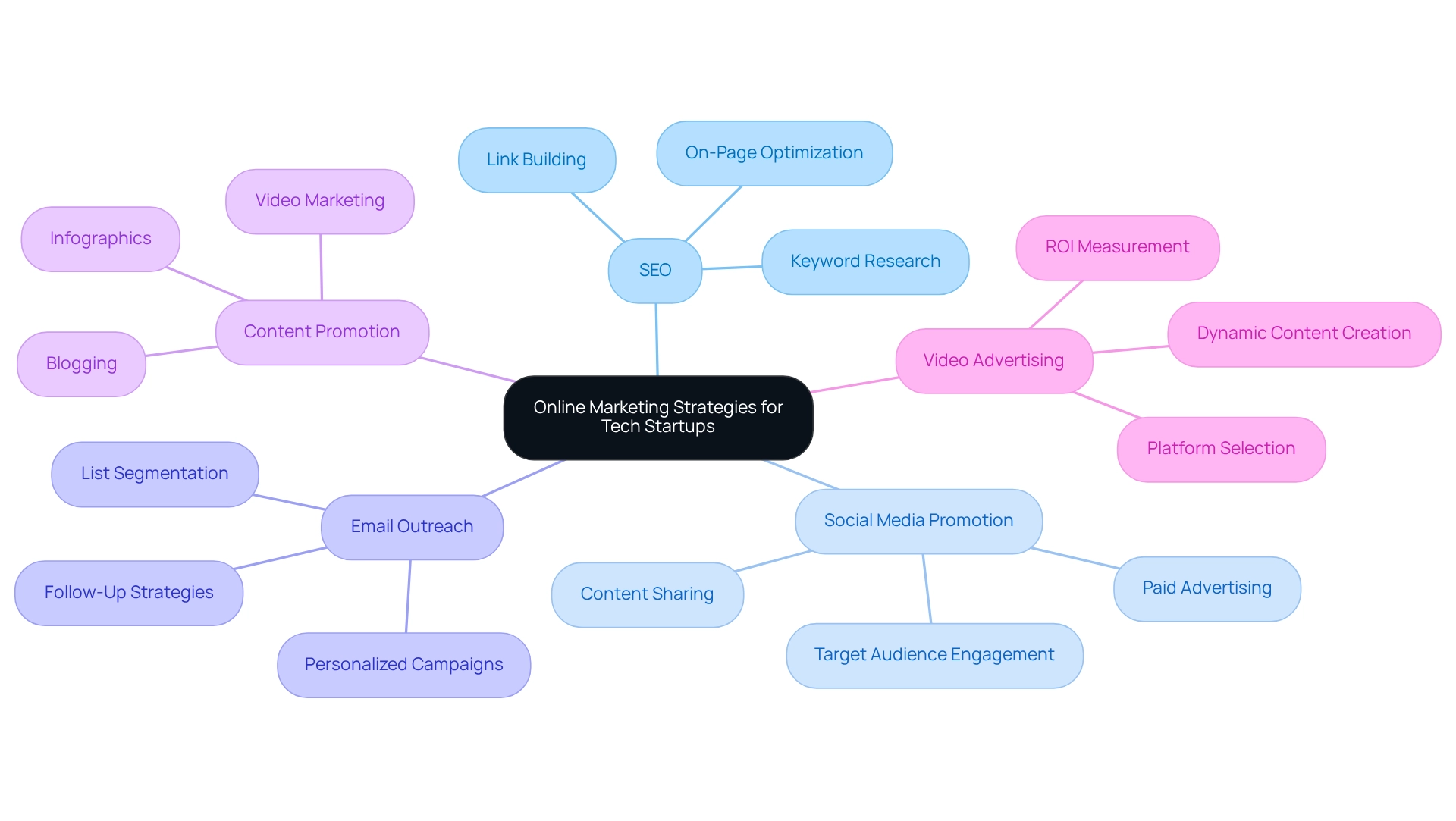
Exploring Different Types of Digital Marketing Strategies
Digital marketing strategies can often feel overwhelming for tech startup founders, who are navigating a competitive landscape. The challenge lies in selecting the right approaches that not only enhance visibility but also foster genuine connections with their audience. This is where RNO1 can step in to help, offering guidance and support through a range of effective strategies.
- Search Engine Optimization (SEO): Improving website visibility on search engines is essential for drawing organic traffic. As we look ahead to 2025, effective SEO practices are projected to significantly elevate site rankings, inviting more visitors and potential customers. RNO1’s commitment to creating innovative online experiences exemplifies how startups can harness the power of SEO to shine in a crowded market.
- Content Marketing: Crafting valuable and informative content allows businesses to engage their target audience and establish authority in their industry. This nurturing approach not only cultivates leads but also builds customer loyalty, positioning content marketing as a cornerstone of contemporary promotional techniques. Successful collaborations, like those RNO1 has nurtured, underscore the importance of aligning content with the needs of the audience.
- Social Media Marketing: With nearly 93% of internet users active on social media, platforms such as Facebook, Instagram, and LinkedIn are vital for connecting with audiences. The social media market is anticipated to reach nearly $256 billion by 2028, emphasizing its growing significance in digital marketing. As Chris Arkenberg insightfully notes, "media and entertainment firms—including advertisers—are vying for an average of six hours of daily media and entertainment time per individual." This reality highlights the necessity for effective social media strategies that resonate with users.
- Email Marketing: Sending targeted messages to nurture leads and retain customers is a powerful approach. Personalized email campaigns can significantly enhance engagement rates, fostering deeper relationships with customers.
- Pay-Per-Click (PPC) Advertising: Running ads on search engines and social media enables businesses to drive immediate traffic to their sites. With mobile advertising projected to represent 77% of all digital ad expenditure in 2024, PPC remains a crucial element of successful promotional strategies.
By integrating these diverse approaches, tech enterprises can develop robust promotional plans that cater to their unique needs. For example, the successful synergy of SEO and content promotion can lead to improved visibility and engagement. Various case studies showcase startups that have effectively aligned their content with SEO best practices. One such case study, titled 'Bridging Promotion and Sales with Conversation Analytics,' reveals how misalignment between promotion and sales teams can impede revenue goals.
Utilizing conversation analytics allows companies to gain insights into call quality and lead conversion, ultimately enhancing collaboration and customer experiences.
The benefits of these strategies are significant. Expert perspectives suggest that a comprehensive approach can lead to heightened brand recognition, improved conversion rates, and sustainable growth. As the online landscape continues to evolve, staying informed about new trends in SEO and content promotion will be vital for tech companies aiming to thrive in a competitive environment. Remember, RNO1 is here to support you on this journey.
The Advantages of Embracing Digital Marketing
In today's fast-paced business environment, many startups face the daunting challenge of establishing a strong market presence. The pressure to compete can be overwhelming, especially when resources are limited. However, embracing digital marketing can offer a lifeline, providing numerous advantages that can help startups thrive.
- Cost-Effectiveness: For many startups, budget constraints are a significant concern. Digital marketing typically requires a lower budget compared to traditional methods, making it an accessible option. As LYFE Marketing highlights, "Digital marketing is certainly much more cost effective than traditional marketing, and it also has a host of other benefits, which we list below." By 2025, companies are increasingly recognizing the value of online approaches, such as RNO1's Ryde initiative, which focuses on creating content for national campaigns. Creative strategies for expanding omnichannel brand ambassador programs can lead to a remarkable 28% rise in ROI, particularly when combined with quality assurance, A/B testing, and careful email testing.
- Measurable Results: One of the most reassuring aspects of digital promotion is the ability to track campaign effectiveness in real-time. Tools like Google Analytics provide valuable insights into user behavior, empowering startups to make data-informed decisions that enhance their promotional strategies. This capability is essential for new businesses aiming to optimize their resources and maximize their impact, especially when leveraging influencer partnerships to broaden their reach.
- Targeted Reach: The precision of digital promotion allows startups to connect with specific demographics, ensuring that their efforts resonate with the most relevant audiences. This targeted approach not only boosts engagement rates but also enhances conversion potential, as campaigns can be tailored to meet the unique needs of different customer segments. RNO1's focus on enhancing e-commerce engagement through influencer partnerships beautifully illustrates this strategy.
- Increased Engagement: The interactive nature of digital content and social media platforms fosters direct communication with customers, nurturing brand loyalty. For example, a tech startup utilizing social media can engage its audience through polls and Q&A sessions, effectively building a community around its brand. Such levels of involvement are often unattainable through traditional promotional channels. The role of influencer promotion in B2B settings further emphasizes the potential of online strategies; firms collaborating with industry leaders or producing branded podcasts have reported significant increases in customer interaction and brand recognition.
- Expert Opinions: Advertising specialists consistently highlight the cost-efficiency and quantifiable outcomes of online promotion. They affirm that marketing online is not only more economical but also offers a range of advantages that traditional methods cannot match. This perspective is particularly valuable for new businesses striving to establish a solid market presence without incurring excessive expenses.
- Case Studies: The case study on influencer promotion in B2B environments showcases how startups can effectively leverage online strategies to enhance their visibility and stimulate growth, even in competitive sectors. By partnering with industry leaders or creating branded content, new businesses can significantly boost their brand recognition and customer interaction, mirroring the approaches taken by successful marketing companies like RNO1's Ryde initiative, which implements user-generated content programs.
In conclusion, the benefits of online promotion for new businesses in 2025 are clear. By utilizing affordable strategies, measurable outcomes, targeted outreach, and increased engagement, startups can position themselves for success in the digital landscape. RNO1's commitment to innovative digital experiences and creative strategies further illustrates the potential for new businesses to flourish. Remember, you are not alone in this journey; the right digital marketing approach can make all the difference.
Setting Clear Goals and Identifying Your Target Audience
Setting clear, measurable objectives is crucial for any effective promotional strategy. Yet, many startup founders struggle with this aspect, leading to frustration and uncertainty. These goals should adhere to the SMART criteria: Specific, Measurable, Achievable, Relevant, and Time-bound. For instance, a technology company might aim to increase website traffic by 30% within six months. This specificity not only clarifies the objective but also provides a benchmark for success.
Identifying the target audience is equally vital. It involves developing detailed customer personas that reflect demographics, interests, and behaviors. This nuanced understanding allows businesses to customize their messaging and choose the most effective promotional channels. For instance, a new business aiming to engage young professionals may prioritize platforms like LinkedIn and Instagram, where this demographic is most active.
As we look towards 2025, the significance of establishing SMART goals becomes even clearer. A staggering 83% of companies now support the OKR framework to align organizational objectives and improve outcomes. Additionally, promotional teams can set specific targets, such as increasing purchasing rates by 7% within a month, adjusting timelines based on customer response data to ensure relevance and effectiveness. This statistic underscores the necessity of measurable goals in achieving success in promotion.
RNO1's dedication to transformative online experiences and fruitful partnerships further stresses the importance of these strategies for technology startups. Expert advice emphasizes that creating customer personas is not just beneficial but essential in today’s digital landscape. As strategy expert Natalia Korotchenko observes, this approach guarantees a focus on genuine priorities and promotes ongoing enhancement in promotional processes.
Moreover, case studies, like the 'Ten Measures Design Tests' created by Professor Andy Neely, demonstrate how to assess objectives beyond conventional SMART criteria. These tests provide additional filters to ensure that chosen measures are relevant, consistent, and actionable, helping marketers refine their performance tracking. This comprehensive approach to goal-setting and audience identification is vital for marketing online companies and tech startups looking to thrive in a competitive market. By embracing these strategies, founders can foster a sense of direction and purpose, ultimately leading to a more successful and fulfilling journey.
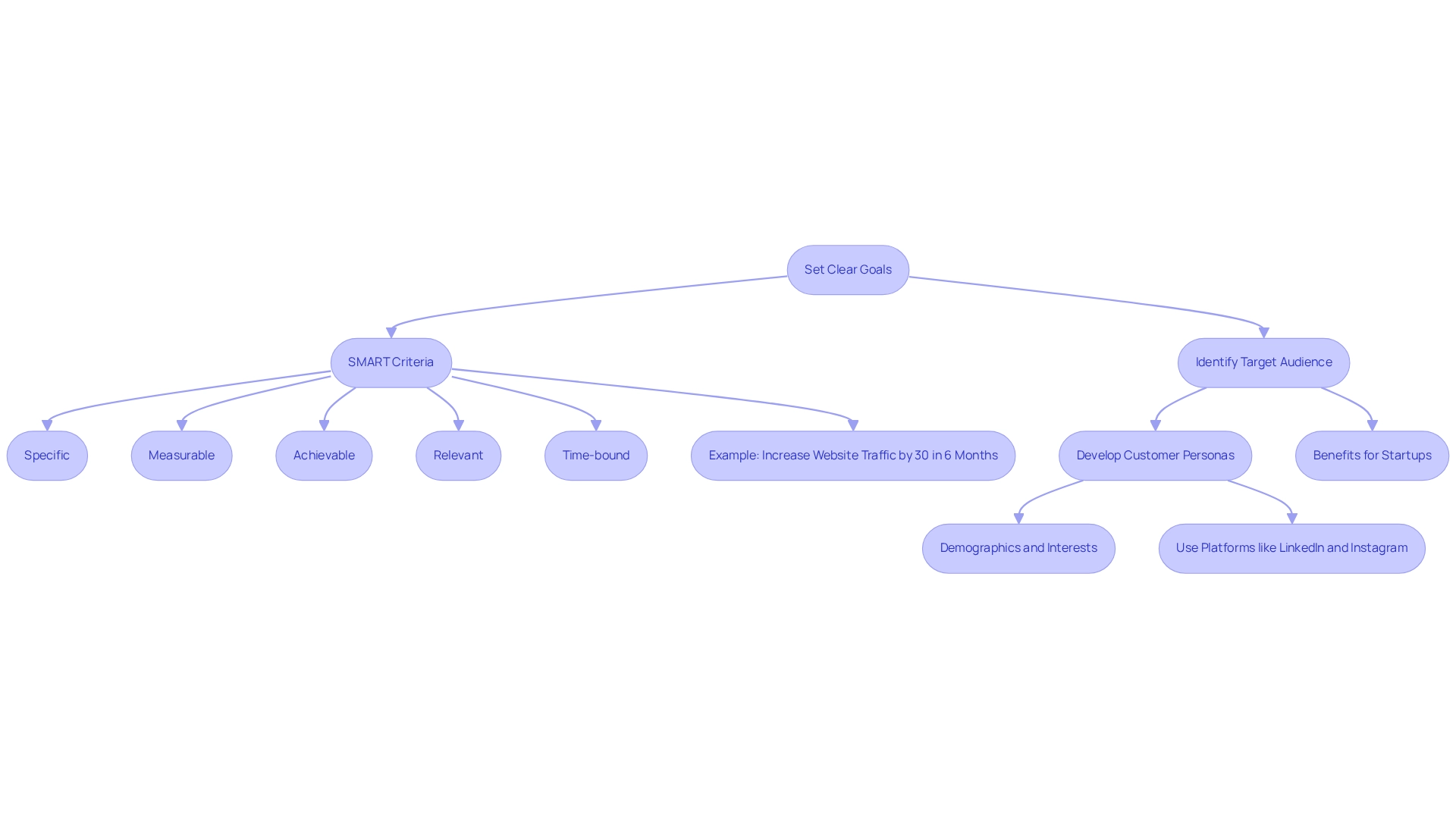
Implementing Performance Marketing for Measurable Results
Performance marketing presents a challenge for many tech startup founders, as it requires a data-driven approach that emphasizes measurable outcomes. This can feel overwhelming, especially when considering that businesses often pay only for successful results, like clicks or conversions. In today’s digital landscape, where 62% of advertising in the past year was conducted by online marketing companies, the pressure to succeed is palpable. Projections indicating growth beyond 8.4% this year only add to this urgency. It’s worth noting that companies like TikTok generated $4 billion in advertising revenue in 2022, with expectations for this figure to double by 2024. This underscores the critical role of online advertising for tech startups, who must navigate these waters with care.
Key components of performance marketing can feel daunting, but they are essential for success.
- Tracking and Analytics: Utilizing tools like Google Analytics is crucial for monitoring campaign performance. As Dan Shaffer, Director of SEO.com, insightfully points out, "With 97% of users checking a business’s online presence before visiting, it’s clear that having an optimized digital footprint is the way of the future." This emphasizes the importance of strong tracking systems to measure effectiveness and guide planning, particularly for technology companies that must adapt swiftly to market shifts.
- A/B Testing: Experimenting with different ad creatives or landing pages can be a game changer. A/B testing has shown to significantly impact conversion rates; in 2025, businesses that implemented A/B testing reported a notable increase in their conversion metrics. For instance, segmented email campaigns have been shown to drive 30% more opens and 50% more clickthroughs than their unsegmented counterparts, highlighting the power of targeted messaging.
- Retargeting: This approach focuses on re-engaging users who have previously interacted with the brand but did not convert. For example, a technology company might run a pay-per-click (PPC) campaign and utilize retargeting ads to remind potential customers of their products, thereby increasing the likelihood of conversion. The effectiveness of retargeting by marketing online companies is evident in the growing investment in video advertising, projected to reach significant spending figures in the coming years, reflecting its ROI potential. A case study on video advertising shows that companies using this medium report good ROI, further highlighting its significance in performance approaches.
As we look to 2025, performance promotion trends suggest a transition towards more data-informed approaches. New businesses are increasingly utilizing analytics to enhance their promotional efforts. The significance of tracking and analytics cannot be overstated; they form the backbone of effective performance strategies, enabling businesses to adapt and thrive in a competitive environment. By embracing these approaches, tech startups can improve their promotional effectiveness and foster sustainable growth, navigating the complexities of performance marketing with confidence and support.
The Role of Branding in Digital Marketing Success
Branding stands as a cornerstone of success for online marketing companies, acting as a vital differentiator in an increasingly competitive landscape. A robust brand identity is more than just a logo; it helps businesses stand out and cultivates customer loyalty, essential for long-term growth. RNO1's tactical rebranding of Founder's Haven exemplifies this approach, focusing on empowering contemporary founders to achieve online success through effective marketing strategies.
Many founders face the challenge of establishing a consistent and recognizable brand. This is where the importance of consistency comes into play. A uniform brand voice and visual identity across all digital platforms are crucial. Consistency not only reinforces brand recognition but also builds trust, making it easier for consumers to connect with the brand. Research from The Design Council reveals that 73% of consumers make purchasing decisions based on a product's visual appeal. This underscores the significance of cohesive design in branding strategies.
Another pivotal aspect of effective branding is storytelling. Crafting a compelling brand narrative resonates deeply with the target audience. As we look ahead to 2025, the significance of brand storytelling will only continue to rise. Consumers increasingly seek authentic connections with brands. A well-told story communicates a brand's values and mission, fostering deeper engagement and loyalty. Experts emphasize the importance of storytelling in enhancing value propositions, particularly for technology companies. RNO1's focus on storytelling in its rebranding efforts illustrates how modern founders can leverage this technique to connect meaningfully with their audience.
Articulating a clear value proposition is also vital. It’s essential to convey what distinguishes your brand from competitors. For instance, a tech startup that emphasizes its commitment to innovation and customer-centric solutions can attract a dedicated customer base that appreciates these qualities. This approach not only enhances brand perception but also instills consumer confidence in purchasing decisions. RNO1’s expertise in hyper-scaling eCommerce, as demonstrated in its case study with Cirkul, highlights how a strong value proposition can lead to measurable success.
The importance of branding in online promotion is further illustrated by the substantial growth in marketing companies, particularly in search advertising, which generated £13.1 billion in the UK in 2022—a 13% increase from the previous year. This trend emphasizes the need for brands to invest in their identity and messaging to effectively capture market share. The case study titled "Visual Appeal in Consumer Decision-Making" reinforces this point, showing that marketers should create visually engaging content that communicates the brand's values and essence, enabling consumers to make quicker and more confident purchasing decisions.
Furthermore, as the social media market is projected to reach nearly $256 billion by 2028, with 93% of internet users actively engaging on these platforms, the role of branding becomes even more critical. Brands that effectively leverage storytelling and visual appeal in their social media strategies are likely to experience enhanced engagement and conversion rates.
In summary, a strong brand identity—defined by consistency, storytelling, and a clear value proposition—is essential for tech startups aiming to thrive in the online marketing landscape by 2025. By focusing on these elements, businesses can build lasting relationships with their customers and drive sustainable growth. This client feature, dated Nov 17, highlights how the Founder's Haven brand has been revitalized to enhance the Modern Founder, showcasing RNO1's commitment to empowering entrepreneurs in this technological era.
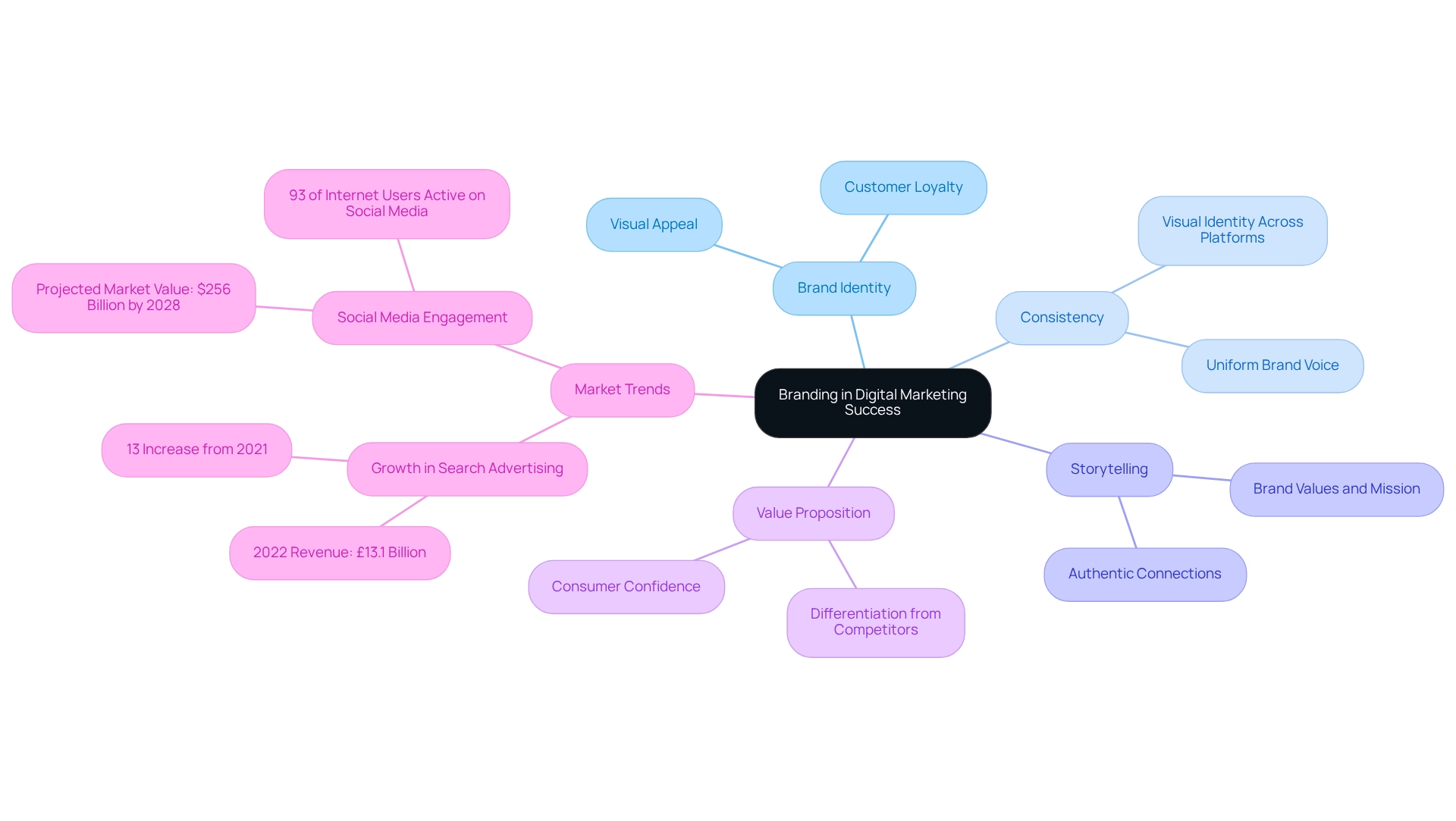
Adapting to Market Trends: The Key to Ongoing Success
Adjusting to market trends can feel overwhelming, yet it is essential for continued success in digital promotion. Many businesses struggle to keep pace with industry developments, consumer behavior, and competitor strategies, which can lead to feelings of uncertainty. However, understanding these dynamics is crucial for staying competitive. Here are some nurturing approaches to help you adapt successfully:
- Continuous Learning: Staying updated on new technologies and promotional techniques is vital. The digital promotion landscape evolves swiftly, and the global content industry is expected to reach $94 billion by 2025, reflecting an annual growth rate surpassing 10% since 2018. This underscores the importance of adopting content promotion as a fundamental strategy for boosting engagement and website traffic. As highlighted in a recent case study, the effectiveness of content promotion is increasingly recognized as a key factor in driving revenue growth.
- Adaptability: It’s important for companies to be ready to adjust their promotional approaches based on performance data and market feedback. For instance, 61% of shoppers prefer mobile websites that offer search filters. This indicates that businesses must adapt their online platforms to enhance user experience and meet consumer expectations. Moreover, search advertising in the UK generated £13.1 billion in 2022, a 13% rise from the previous year, emphasizing the need to adjust promotional strategies to seize emerging trends in online advertising.
- Innovation: Embracing new promotional channels and formats is essential. Tech companies, in particular, can benefit from exploring innovative methods like augmented reality in their promotional campaigns, creating engaging and memorable customer experiences. This willingness to innovate not only captures attention but also fosters stronger connections with audiences.
As the online environment continues to evolve, the importance of ongoing education and innovation in promotional strategies cannot be overstated. Industry leaders remind us that staying ahead of technological changes is key to capitalizing on new opportunities. Jeff Loucks, Executive Director at Deloitte’s Center for Technology, Media & Telecommunications, emphasizes the necessity of adapting to technological change to remain competitive.
For example, before making a purchase, 59% of online consumers use Google to seek reviews, highlighting the vital need for companies to establish a strong online presence, including a Google My Business account.
By embracing these nurturing approaches, tech startups can successfully navigate the challenges of online promotion in 2025 and beyond, ensuring they remain relevant and competitive in a constantly evolving market.
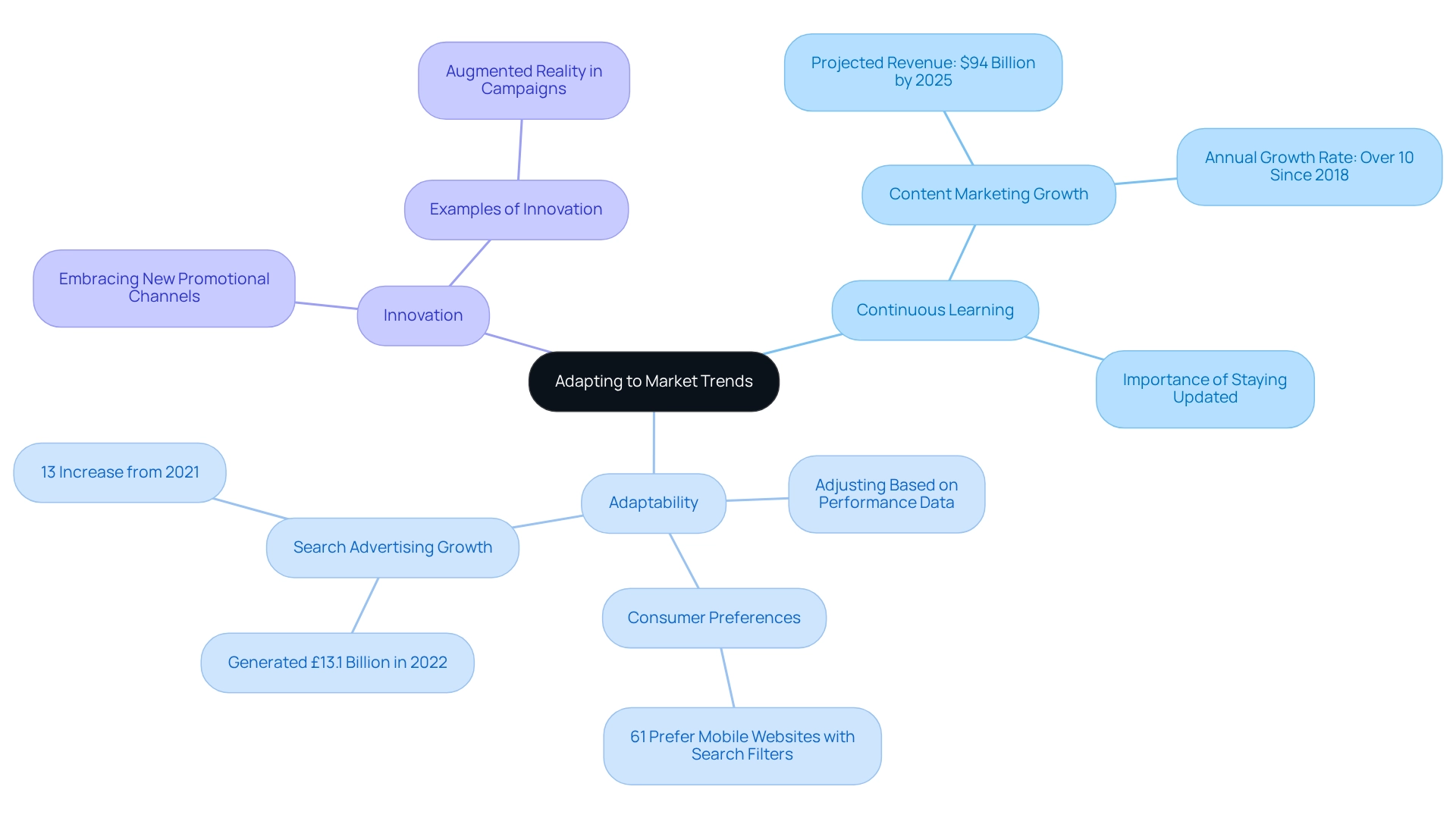
Best Practices for Effective Digital Marketing Execution
To successfully implement online promotional techniques, it's essential to consider the following best practices that resonate with the challenges you may face:
- Integrate Channels: Embracing a multi-channel approach can significantly enhance your visibility and engagement across various platforms. This strategy not only aligns with consumer preferences but also reflects in the statistics: 80% of online marketing companies utilizing multi-channel methods report improved brand awareness. Moreover, 20% of U.S. marketers experience a return of $6 or more for every dollar spent on podcast ads, showcasing the potential advantages of diverse channels. RNO1's Ryde initiative serves as a powerful example, scaling omnichannel brand ambassador programs through influencer partnerships to maximize reach and engagement—an essential aspect for marketing online companies. As we look ahead to 2025, the importance of quality content remains pivotal, directly influencing the effectiveness of your digital promotions. Ascend2 reveals that 37% of marketers identify 'data quality' and 27% highlight 'data quantity' as significant obstacles in creating a multi-channel promotional strategy, underscoring the necessity for quality content. RNO1 enhances luxury funnel messaging tailored for e-commerce communities, ensuring your content resonates with targeted audience segments.
- Utilize Data Analytics: Regularly analyzing your campaign performance is crucial in identifying areas that need improvement. Many marketers grapple with data quality and quantity, making it vital to leverage analytics for informed decision-making. RNO1 supports the expansion and adaptability of influencer and ambassador initiatives by providing insights from marketing online companies, enhancing your strategies for better results.
- Engage with Your Audience: Fostering two-way communication through social media and email outreach can greatly benefit your connection with potential customers. For instance, a tech startup might host webinars to educate their audience while simultaneously gathering feedback to refine their offerings. RNO1's approach includes curating and executing national user-generated content programs that drive campaign virality, enhancing community engagement—an essential element for marketing online companies. Additionally, developing structured sales funnel sequences can guide potential customers through their journey, ensuring a smooth transition from awareness to conversion. RNO1's strategies encompass effective influencer onboarding procedures that facilitate engagement and retention of brand ambassadors for marketing online companies.
A notable case study highlighting the success of a multi-channel promotional approach is Camping World. By implementing a comprehensive strategy that included email and paid media campaigns, they effectively reached customers and competed against larger brands. This initiative resulted in a 35% rise in conversion rates on paid channels and a 12% enhancement in overall campaign effectiveness.
These examples emphasize the importance of combining various promotional channels, such as marketing online companies, to improve consumer engagement and achieve meaningful results.
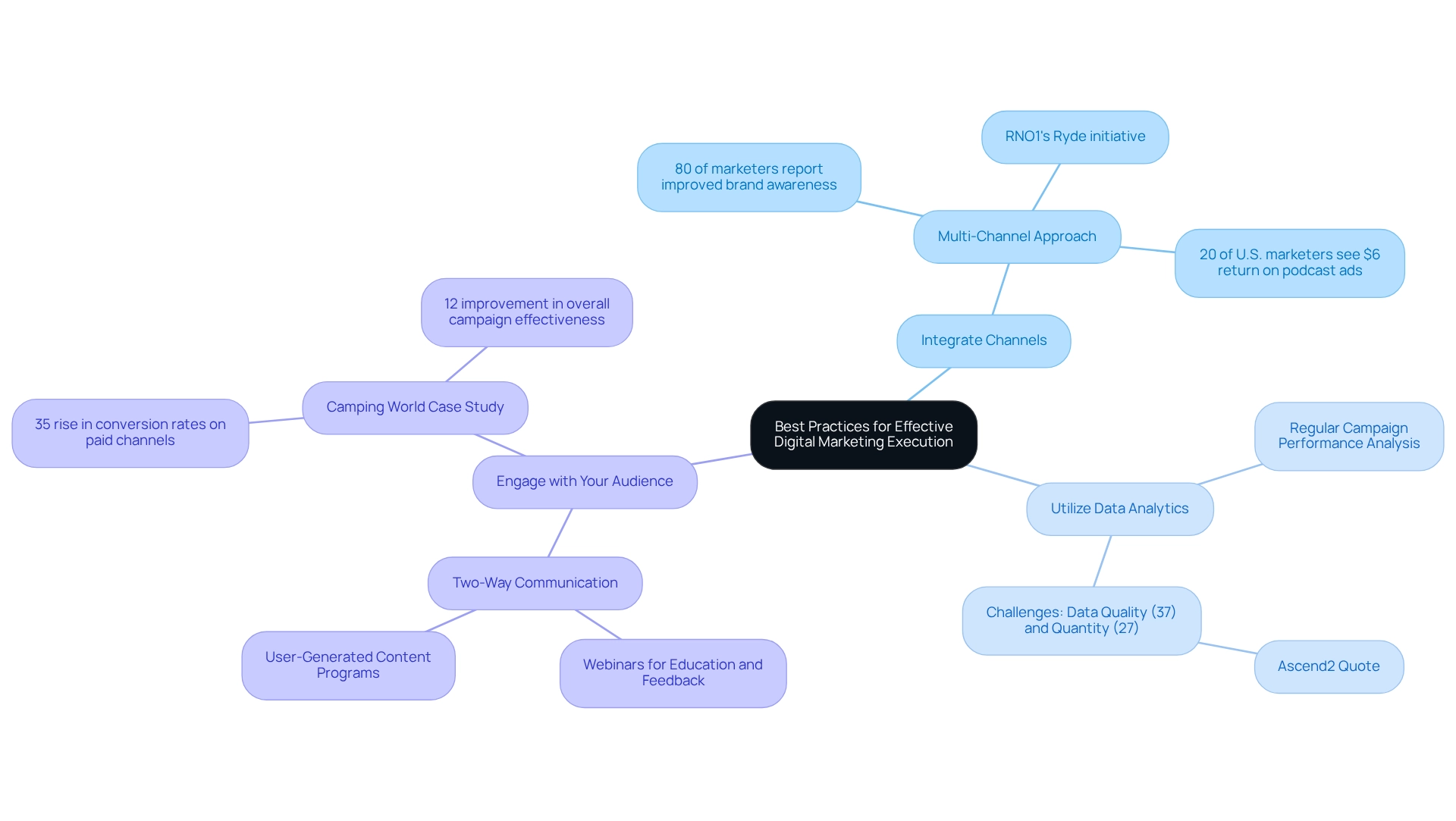
Building Long-Term Partnerships for Sustainable Growth
Establishing long-lasting collaborations can feel daunting for many tech startup founders, especially in the fast-paced digital realm. The challenge lies in navigating these relationships to foster sustainable development. However, inventive approaches, such as RNO1's Ryde initiative, offer hope and guidance. Effective strategies to cultivate these relationships include:
- Identify Complementary Partners: Seek out businesses that target a similar audience but offer different products or services. This alignment can create opportunities for cross-promotion and shared resources, enhancing overall market reach. RNO1's method for expanding omnichannel brand ambassador initiatives illustrates how selecting the right collaborators can enhance promotional efforts.
- Establish Clear Goals: Define mutual objectives to ensure that both parties benefit from the partnership. This clarity fosters accountability and drives collaborative efforts toward shared success. For instance, RNO1's focus on enhancing e-commerce engagement through influencer partnerships can serve as a model for setting clear, actionable goals.
- Maintain Open Communication: Regularly engage with partners to discuss progress, share insights, and modify approaches as necessary. For instance, a tech startup could collaborate with a digital promotion agency to utilize their expertise while focusing on product development. This symbiotic relationship not only accelerates growth but also enhances the efficiency of promotional initiatives, much like how RNO1 fosters the expansion and scalability of influencer and ambassador programs globally, encompassing the implementation of national user-generated content campaigns and gamification techniques.
Statistics indicate that 80% of consumers are more likely to make a purchase when brands provide personalized experiences. This underscores the importance of customized promotional approaches that robust collaborations can facilitate, allowing brands to offer more personalized experiences to their customers. Additionally, long-term partnerships in influencer promotion, as illustrated by RNO1's initiatives, have proven to cultivate brand loyalty and consistency in messaging, leading to increased audience trust and a unified brand narrative.
These partnerships empower influencers to internalize and authentically communicate the brand's values, which is essential for building lasting relationships with consumers.
As businesses look to 2025 and beyond, the impact of complementary partnerships on growth becomes increasingly evident. Marketers who scale conversation analytics report improved customer acquisition and retention, with 43% of them having improved or expecting to improve these metrics as a result. This emphasizes the significance of data-driven strategies in partnership dynamics, indicating that new ventures can leverage conversation analytics to enhance their promotional efforts and strengthen collaboration with partners.
Expert opinions emphasize that building long-term partnerships is not just beneficial but necessary for sustainable growth in marketing online companies within the digital landscape. By identifying and nurturing these relationships, startups can position themselves for success in an ever-evolving market. As Ryan Klekas, Director of Channel Partnerships at Bombora, noted, "In just two months of using Crossbeam, I discovered hidden pipeline and closed $100,000 worth of new business," illustrating the tangible benefits that can arise from effective partnerships.
Continuous optimization and adaptation in these collaborations will ensure that businesses remain competitive and responsive to market changes.
Conclusion
Navigating the complexities of digital marketing can feel overwhelming for tech startups striving for sustainable growth in 2025 and beyond. Many founders grapple with understanding the foundational elements like performance marketing, audience targeting, and the importance of nurturing long-term partnerships. This struggle can lead to feelings of frustration and uncertainty in a competitive landscape. However, by integrating various digital marketing strategies—such as SEO, content marketing, and social media engagement—startups can enhance their visibility and cultivate meaningful customer relationships.
Establishing clear, measurable goals while truly understanding your target audience is crucial. These steps can significantly influence a startup’s marketing effectiveness. By embracing data-driven approaches and remaining adaptable to market trends, you can make informed decisions that foster engagement and conversion. Additionally, the role of branding is vital; a strong brand identity, characterized by consistency and storytelling, builds customer loyalty and trust, creating a sense of community around your business.
Ultimately, embracing digital marketing strategies not only empowers startups to thrive in a fast-paced environment but also opens doors for innovative partnerships that can lead to long-term success. As the digital landscape continues to evolve, staying informed and adaptable will be key to unlocking new opportunities. By focusing on these essential elements, tech startups can navigate their marketing journey with confidence, paving the way for a brighter future. Remember, you're not alone in this journey; by sharing experiences and insights with one another, we can all grow together.
Frequently Asked Questions
What challenges do tech startups face in online promotion?
Tech startups often struggle with mastering essential digital marketing elements such as search engine optimization (SEO), social media promotion, email outreach, and content promotion, which can feel overwhelming.
Why is mastering online promotional strategies important for tech startups?
Mastering these strategies is crucial for cultivating a strong online presence, connecting effectively with target audiences, increasing sales, and enhancing brand loyalty.
How can SEO benefit tech startups?
SEO can significantly improve a startup's search engine ranking, leading to increased visibility and organic traffic, which is essential for attracting potential customers.
What role does video advertising play in digital marketing?
Video advertising is becoming increasingly important, with projections indicating it will surpass $191 billion by 2024. It is recognized for its strong return on investment (ROI) as a promotional tool.
What are the key online promotional strategies for tech companies in 2025?
Key strategies include SEO, content marketing, social media marketing, email marketing, and pay-per-click (PPC) advertising, all of which enhance visibility and foster customer relationships.
How does content marketing help startups?
Content marketing allows businesses to engage their audience by providing valuable information, establishing authority in their industry, and nurturing customer loyalty.
Why is social media marketing significant for tech startups?
With nearly 93% of internet users active on social media, it provides vital platforms for connecting with audiences, and the social media market is expected to reach nearly $256 billion by 2028.
What advantages does email marketing offer?
Email marketing allows for targeted messaging that nurtures leads and retains customers, significantly enhancing engagement rates and fostering deeper relationships.
How does RNO1 support tech startups in online promotion?
RNO1 offers guidance through innovative performance promotion techniques, transparent communication, and a flexible subscription model to help startups navigate promotional challenges effectively.
What are the benefits of using digital marketing over traditional marketing for startups?
Digital marketing is more cost-effective, provides measurable results, allows for targeted reach, and increases engagement, making it a valuable option for startups with limited resources.




